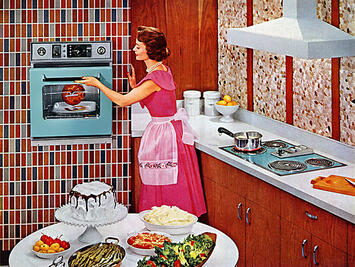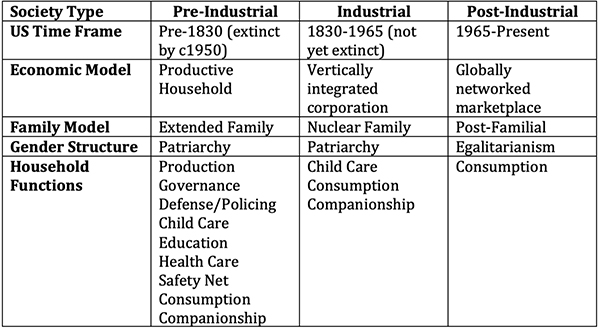
My monthly deep dive newsletter will be out next week and looks at one of the gaps in our society’s thinking about femininity. In preparation for that, I wanted to highlight again the way that conservatives have failed to account for the impact of industrialization on the household in their thinking about gender roles.
Back in newsletter #26 I talked about how the shift to industrial and post-industrial society denuded the household of most of its functions. Here’s a chart I created to illustrate some of the shifts the occurred.
As I noted, conservatives often stick with the idea that women should primarily be in domestic roles, especially focused on childrearing. Christians will cite Titus 2:5 about women being “keepers at home.” But being a keeper at home had a much different connotation in pre-industrial society than it does today. For example, in the famous Proverbs 31 passage about finding a good wife, we see that her husband is a man of prestige, who is at the gates of the city representing the household in the governance of the polis. She is indeed based at home, but there she is overseeing a vast household economic enterprise.
In industrial society, the wife is reduced to a homemaker. This may have suited some women temperamentally or during certain stages of life such as when caring for young children, but it provided limited opportunities for women with high IQs or an orientation towards production to put their talents to use. This was part of the complaint of the early second wave feminists. The industrial era non-productive housewife who focuses on childrearing and housework is itself a historic anomaly.
Human societies have always had a strong sex role division of labor, but the female roles were historically productive ones. Today they are sub-productive (and uncompensated) appendages to the market economy, or what Ivan Illich termed “shadow work.” Shadow work includes commuting, “some assembly required” tasks and other such matters. But much of it is domestic work done by women. Illich compellingly argues that this is fundamentally different from character from pre-industrial household productive labor...
Read the rest of this piece on AaronRenn Substack.
Aaron M. Renn is an opinion-leading urban analyst, consultant, speaker and writer on a mission to help America's cities and people thrive and find real success in the 21st century. He focuses on urban, economic development and infrastructure policy in the greater American Midwest. He also regularly contributes to and is cited by national and global media outlets, and his work has appeared in many publications, including the The Guardian, The New York Times and The Washington Post.
Photo: James Vaughan via Flickr under CC 2.0 License













